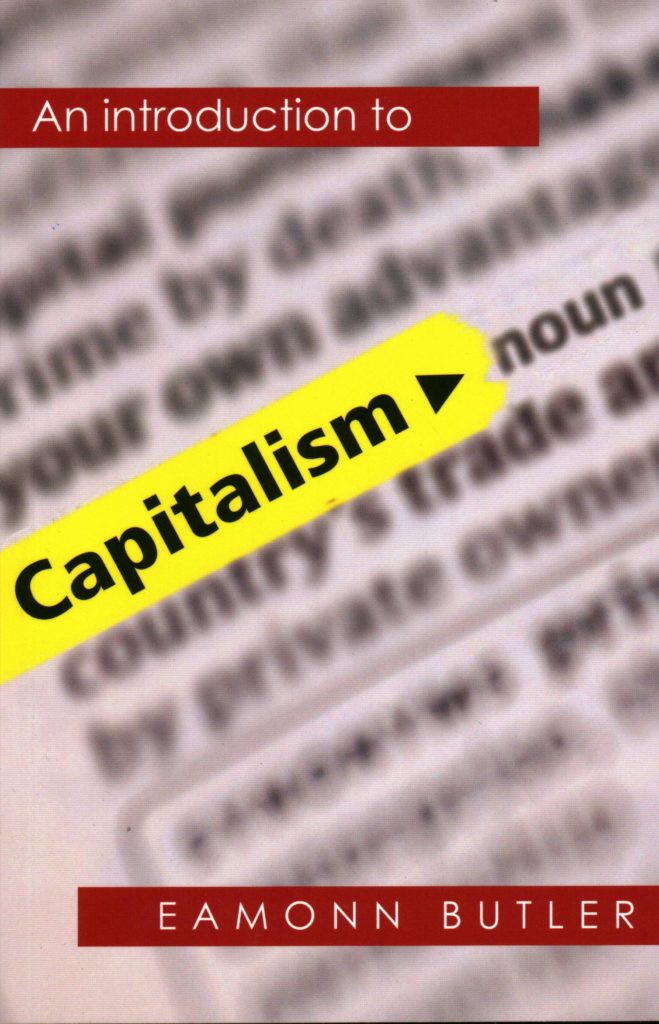
If you would like a clear, coherent, and concise primer on capitalism, read An Introduction to Capitalism. Its author, Dr. Eamonn Butler, is a co-founder of the Adam Smith Institute in London, and the book is a great introduction. It’s written in plain English, assumes no prior knowledge of economics, and contains no academic or economic jargon.
The central issue in defending capitalism is its moral foundation—or, as its opponents claim, its immorality. This is fundamentally a matter of self-interest (selfishness) vs. altruism (self-sacrifice). Dr. Butler argues admirably in defense of the widely misunderstood concept of self-interest. Here’s a passage in which he addresses it:
Self-interest. Capitalism is motivated by self-interest, but punishes greed. The two are quite different.
Greed suggests acting in one’s own interest, without a care for the interests or feelings of others, and perhaps even without a care for the prevailing laws, regulations, and conventions. It suggests accumulating things for the sake of it, regardless of one’s need. But capitalism can only work when people follow the rules, deal fairly with each other, and honor promises. Fortunately, thanks to the competition from many of the buyers and sellers, anyone who lies and cheats in business will soon find customers and suppliers deserting them. The only way to prosper is to provide others with what they want. Far from disregarding the interests of others, capitalism makes us keen to know them and serve them.
Self-interest means people pursuing their own aims, vision, purposes, and ambitions, not those imposed on them by others. They pursue those dreams not just for their individual benefit, but for the benefit of their families and others whom they love and care about. They collaborate with others, in trade for example, when it is in the mutual interest of both sides.
Later, Dr. Butler writes:
The American political thinker [philosopher and novelist] Ayn Rand (1905–82), argued that capitalism was the only moral social system because it alone did not rely on force to sustain it. Rather, it works only through voluntary exchange. Nobody is forced to deal with anyone else. To persuade people to trade with you requires mutual respect and trust…
The last paragraph of Dr. Butler’s book:
Ayn Rand’s Capitalism: The Unknown Ideal (1966) is an eclectic series of essays on a variety of subjects, laying out Rand’s robust support for radical capitalism. It roots capitalism in the nature, evolution, and rights of humankind; argues that war stems not from capitalism but from statism; bemoans the persecution of big business; discusses markets and broadcasting; reviews patents and copyright forms of property; and argues that capitalism’s “conservative” supporters are suicidally far from understanding, supporting and defending its ideals.
My thoughts on some terminology: Does the word “capitalism” adequately and appropriately name the system of liberty, of respect for individual rights, and of people doing freely what they rationally choose? I don’t think so. I prefer the phrase “free enterprise.” “Free” because liberty is an individual and social requirement for the practice of enterprise. And enterprise (or action) is what individuals do when left free; they make the most of their capabilities to flourish and prosper, both individually and in concert and cooperation with others. So, free enterprise more correctly identifies the activities of “capitalism”; it is more fundamental and descriptive and spans the three realms that the word “capitalism” now stretches to cover: politics, economics, and enterprise.
Capitalism, fundamentally, is about production and trade—i.e., business. Businesses and businessmen are the stuff of capitalism, its basic components. Economics tries to define and explain business activity and markets, whereas governments often act to interfere, control, regulate, and loot businesses via taxes, tariffs, regulations, and the redistribution of wealth.
Whatever we call the system of free enterprise, we need to educate people about its nature and moral foundations. And we need to stand for the rights of businesses and businessmen to produce and trade freely. Dr. Butler’s book is a welcome addition to the corpus on both counts.